- Home
- Catherine Coulter
Wyndham Legacy Page 10
Wyndham Legacy Read online
Page 10
She saw that Mr. Wicks was quite distressed, shaking his head, mumbling, “I still cannot believe his insults to you. You have never harmed him. Indeed, you wished to set everything aright. He didn’t even give you a chance to speak. You would have accepted him, wouldn’t you, Duchess?”
“Yes, I would have accepted him, but he was very angry, Mr. Wicks. He wasn’t ready to listen to any acceptance even if I’d shouted it in his face.”
“I do not like anger, it leads to unfortunate conclusions, usually conclusions not wished by either party.” He shook his head. “To insult you as if you weren’t a proper lady, as if you were—”
“Still a bastard?”
“You’re being purposefully obtuse,” Mr. Wicks said sharply, and she saw that he was really quite pained on her behalf. She tried to smile, but it was a pitiful effort.
“What he said to you wasn’t what a gentleman would ever utter, it was ugly and utterly unjust—”
She just shook her head, saying nothing, just shaking her head slowly, back and forth. “It doesn’t matter,” she said finally. “Truly, sir, you are kind to be upset for me, but it doesn’t matter.”
“But there is so much at stake here. Surely he will see things differently in the morning.”
But he didn’t.
In the morning, the VIII earl of Chase was gone.
His valet, Spears, was also gone.
WYNDHAM TOWNHOUSE, BERKELEY SQUARE, LONDON
MAY 1814
She smiled as she opened the window wider, leaning out so she could better hear. She saw them then, three soldiers, slightly drunk, singing at the top of their lungs, their arms entwined around each other, probably to keep themselves upright. The ditty was about Napoleon, upon his abdication.
“He bid a fond adieu to all his old Guard.
They cried and moaned, like pigs swilling lard.
But at last he’s gone, dragged off Elba way,
To molder like hay from December to May.”
It was a catchy tune, she thought, still smiling, even sung off-key. The rhyme wasn’t all that remarkable, but it fit in with the melody just fine. They reached the chorus now and their voices became louder and merrier.
“And it’s hidey ho, off ye go, to Elba where ye’ll stay.
It’s up with the anchor to sail ye away, far away
To Elba where ye’ll die and rot, forever and a day.”
To her absolute delight, they no sooner finished that ditty than they broke into another, this one about Wellington upon receiving word that Napoleon had abdicated. The two were meant to go together, surely.
“He was pulling on his boots so it was said,
planning the next campaign, all in his head.
Then the messenger came all out of breath,
shouting, ‘No more death, no more death.’
“And Wellington said, ‘Leave me be, leave me be,
I’ll put on my shirt and then I’ll see.’
“But the messenger grinned and danced with guile,
shouting, ‘Listen, milord, he’s choked on his bile.
Napoleon’s eaten his hat, tossed down his sword.
We’ll now go home and all be bored.’
‘Hurrah, Hurrah,’ said Wellington.
‘By God, we’ve done it, by God, we’ve won!
No more battles, no more glory,
I’m England-bound to become a Tory.’ ”
She was grinning like a fool at the lilting melody, and the way the soldiers were butchering it and having such fun doing it. They enjoyed it, that was the point. She drew back into her bedchamber as the soldiers passed out of her sight and her hearing, down the street and around the corner, their voices becoming a faraway echo.
The words weren’t perfect, oh no, but to sing about what Wellington had supposedly said, it was warming, at least to her. There was another song, this one shorter, but she’d heard it several times already when she’d been out walking with Badger in St. James and had seen it being sold at Hookhams. Both the words and the music had been hastily printed, and thus reading it was difficult, but evidently enough people managed well enough. It was about the French Senate, manipulated by the astute and cunning Talleyrand, who had doubtless convinced the Czar to vote in old Louis to become king, and now that fat old idiot, brother to the late King, would now become Louis XVIII.
And now, wherever he was, Marcus was safe. He’d been safe since April 6, the day Napoleon had abdicated, no, that wasn’t true, there’d been another huge battle at Toulouse and a myriad of small skirmishes. God, how she’d prayed he hadn’t been in Toulouse, the loss of life in that needless battle had been staggering. Surely he wouldn’t have been there, surely. Spears would have gotten her word somehow.
Soon she would know exactly where he was. Soon, she would have him, the stupid fool, for time was growing short.
She walked to her small writing desk, opened the bottom drawer, and pulled out Spears’s last letter. Unfortunately the letter was dated at the end of March. He’d written that he and his lordship were off on an assignment and he didn’t know where they were being sent. He would inform her, he concluded, when he was able. He ended by assuring her that his lordship continued in his stubborn ways, but even a stoat could be brought about to mend his manners, perhaps. He finished by saying that all hell was breaking loose now.
What did that mean? It made her shudder. What if he had been wounded or killed after Napoleon’s abdication? She’d searched the papers for war news, for the notices of deaths. No word of Marcus. She wouldn’t believe he was dead, never, for she knew that if anything had happened to him, Spears would have managed to get back to her, yes, yes, he would, she must believe that or go mad. No, he was well. She folded the letter and slipped it back into the desk drawer.
That evening, a balmy spring evening so enjoyed by lovers, as she sat alone in the magnificent drawing room of the Wyndham townhouse in Berkeley Square, she realized she had to devise a plan, a campaign really, just as Wellington was always doing, mostly with outstanding success. Once she found Marcus, she couldn’t really see him succumbing to reason, despite all the private conversations she’d created, first playing herself and then playing him. No, it would take more than words and sound reason. With Marcus, it would require an assault, the use of guile and cunning. Not a frontal assault, but an assault that would allow for no unforeseen deviations by his clever and equally cunning lordship. She rose, rang the bell cord, and waited for Badger. She hummed the ditty she’d heard earlier, treasuring the melody and the words alike.
When Badger appeared in the drawing room, she grinned at him, not at all a stingy grin, and announced blithely, “I’ve got it now, Badger. The Plan. Are you all set to leave the moment we hear word?”
“I’ve been ready for three weeks, Duchess,” Badger said, grinning back at her. “His bloody lordship doesn’t stand a chance if you’ve finally got a plan.”
“No, he doesn’t, the fool.”
8
PARIS
MAY 1814
HE’D BEEN AN ass, a complete sod of an ass, and he wished he could forget it, but he couldn’t seem to, even though so many days and weeks had passed. It was always there in the back of his mind, ready to spring back and shout it to his face, like now. Damnation, but he’d been bloody unfair to her. Not that she’d shown any particular pain or distress when he’d shouted all those things at her—calling her cold-blooded, frigid, for God’s sake—insulting her until if he’d been her, he would have killed him. Dead, right on the spot, but she hadn’t, she’d just sat there, looking at him, saying nothing, damn her beautiful eyes, damn her control. Control, something he’d lost completely.
He hated being an ass and realizing it and feeling guilty about it. And he’d done nothing about it. He’d not written an apology to her, for surely what her father had done wasn’t her fault, no, he’d done nothing at all. God, he wished she were here right now and he would . . . What would he do? He didn’t really know. He hoped he would
apologize for spewing his venom and bitterness on her.
He shook his head. He looked up to see his friend North Nightingale, Major Lord Chilton, come into the vast chamber. He waited until North was close then said, “Ah, here comes Lord Brooks with two of his bootlicking aides, the chinless sots. They were right on your heels.”
“Where they belong,” North said, and smiled, that dark saturnine smile of his, and looked around the immense room with its thirty-foot ceilings and its gilded and lavish gold-and-white furnishings. Marcus was used to the opulence. North wasn’t yet used to the heavy splendor of it, the oppressiveness of it. The room was in the former Parisian mansion of the Duc de Noaille, now on loan to Wellington and his staff. Czar Alexander was just down the street, in the even more splendidly decadent mansion of Talleyrand; he was Talleyrand’s guest, no surprise, Wellington had remarked to Marcus and North shortly after Napoleon’s abdication, since Talleyrand wanted to manipulate Alexander, and having him under his own roof with access to his remarkable cellars, would aid him enormously, as it indeed had.
“Yes, but they’re not all that bad, Marcus—the aides, that is. I heard them singing that new ditty about Talleyrand and how that wily and ruthless old fox is maneuvering not only the Czar but also the French Senate to bring back fat old Louis. They sang rather well as I recall.”
“He’s got no more sense than a goat, does Louis, but at least he’s the rightful ruler.”
“And no more presence than a pompous stoat. Ah, but Talleyrand succeeded, and Louis is now on the French throne. Lord, but I never want to tangle with that man. It’s said that his mistresses put shame to a legion’s numbers.”
Marcus looked bored. “I’ve sometimes wished,” he said after a moment, keeping an eye on Lord Brooks and those two eavesdropping aides of his, “that Talleyrand were English. Castlereagh is a brilliant diplomat; men trust him, but still, it seems to me there’s just too much honor in Castlereagh, not enough guile. He has difficulty, I’ve seen, lying directly into another man’s face.”
“A failure indeed,” North said, and unobtrusively poked Marcus in the ribs, for Lord Brooks appeared to be coming over for a chat.
“My lords,” Lord Brooks said, all amiability as he looked them over, as he did on a daily basis. He was an older man with a fierce tuft of white hair, a large nose, and a brain that was exceeded only by his height, which was just barely over five and a half feet. “So, we now have Louis XVIII as the French king. I believe it an excellent thing that Napoleon has retained his title of emperor, don’t you?”
Marcus thought it the height of stupidity, but said nothing, merely began sorting through some military dispatches.
North said easily, shrugging, “Emperor of what, isn’t that a question that gives one pause? Ah, yes, he is now the sovereign ruler of Elba, an emperor of boulders and beaches and a few scrubby trees.”
Marcus said, “Don’t forget all those French and Polish bodyguards. And he does have a navy, Lord Brooks, the brig Inconstant.”
“You perhaps dwell too lightly on an occurrence that surely justifies more sober reflection,” Lord Brooks said, looked at both men as if he would like to strike his glove on their cheeks, then strode back to his aides.
“What did that mean?” North said.
“God knows.”
“God cares, I’m sure. We’ll be more careful in the future, Marcus. It doesn’t do to insult the man. He’s proud as the devil and hates to be shown his stupidity, a deadly combination.”
They laughed, but not too loudly. There was no point in further angering Lord Brooks.
“I’m bored,” Marcus said. “Bloody bored. I don’t know what I want to do but it isn’t this.”
“I know. There’s nothing but the diplomats dancing around each other now, making promises, breaking them when the dawn breaks. Lord, I sometimes hate diplomats and all the endless games of diplomacy. Ah, Marcus, do smile at Lord Brooks, the old bastard.”
“More intrigue,” Marcus said. “I have this feeling he came over here to discover if we know anything he doesn’t know. I can’t count the times I’ve been approached by underlings of Talleyrand, Metternich, Czar Alexander, to reveal any secrets I might have on Wellington’s stand on this or that, or opinions, as those damned diplomats phrase their requests. Well, damn all of them.”
“Amen,” North Nightingale said. “Your arm looks a bit stiff today, Marcus. You’re moving it awkwardly.”
“I know. Spears never leaves me alone. Every morning he watches me lift my heavy sword, up and down, up and down, very slowly, fifty times to get the arm back to its full strength. Then he massages it. This morning I believe he must have overdone it a bit, it hurts like bloody hell.”
“Still, despite his enthusiasm, it seems to help. It’s been just a matter of weeks since you took that bullet at Toulouse. Trust Spears, he’s a good man.”
“Christ, North, at least I’m alive with but a stiff arm. We lost four thousand five hundred men, not just casualties, as the war ministry says so glibly, and all because a messenger can ride only so quickly to inform Wellington that Napoleon abdicated four days earlier. The damned waste of it. So many men, dead for naught.” He unconsciously rubbed his arm again.
North watched Marcus close and lock the desk drawer, then stare down at the small golden key as delicate as a fine piece of jewelry, so insubstantial it looked. Yet Marcus always kept it with him. There had been two robbery attempts in the past two weeks. Even if a thief ripped the drawer open, he would only find outdated papers, for the secret drawer was well hidden.
The two men left the mansion and spent the next thirty minutes walking along the banks of the Seine, breathing in the clear early evening air, before crossing the western tip of Ile de la Cité on Le Pont Neuf—actually the bridge wasn’t new at all, indeed it was the oldest bridge in Paris. They strolled down the Boulevard Saint Michel, speaking desultorily, cutting over to the Boulevard Saint Germain to where their rooms were located in a large early eighteenth-century mansion, the Hôtel Matignon, at number 57, Rue de Grenelle.
Marcus waved to a fellow officer, crossing the street at a diagonal from them. “We have our own battalion here in the Faubourg Saint Germain.”
“Don’t forget all the Russian soldiers here as well. Last night I had my window open, more fool I. I could hear them singing in their incomprehensible language until nearly dawn, drunker than asses. How the devil do they manage to get up and go about their duties?”
Marcus shook his head. “I’ve seen them staggering in at dawn and up again at seven o’clock. And the number of prostitutes has grown to staggering numbers, the randy bastards.”
“None of them owes any of their wages to you, Marcus. How is the fair Lisette?”
“Fair as usual. I leased a very charming apartment on the Rue de Varenne for her. Her appreciation moved me.”
North laughed. “I’ll just bet it did.”
She was beautifully skilled, Marcus thought. He said aloud, “You know what I really like about Lisette, other than the obvious things? She’s always talking, chattering really, flitting about the chamber, always moving, telling me jests, laughing, always laughing. She’s never silent, never like—”
“Like what? Like who?”
“Like the damned Duchess, if you would know the truth of it.”
North Nightingale looked at the fast-flowing Seine in the distance. “You’re a fool, Marcus.”
“Stow it, North. I’m a lucky man, so very lucky. Do you know that in my pocket at this very minute is a bank draft for two hundred pounds? My quarterly allowance for being the bloody earl of Chase, all duly notarized by Mr. Wicks. It’s taken long enough to catch up to me. I do wonder how Mr. Wicks found me.”
“I do too. You’ve managed to keep yourself hidden from everyone else in England. You won’t turn down the funds will you, Marcus?”
“Hell, no. A goodly portion of it goes to Lisette’s upkeep.” He smiled at that, wondering what Mr. Wicks would say if he knew th
e old earl’s groats were being spent on his hated nephew’s mistress. Well, the old bastard had had his own mistress, the Duchess’s mother. Odd, how it seemed different, given the Duchess.
Where was the Duchess? Back at her damned cottage? Or reveling in her fifty thousand pounds in the middle of London society, entertaining gentlemen who doubtless all drooled on her, damn her beautiful blue eyes. He’d thought about her many times, wondered about what was in her damned mind, wondering, always wondering in those off moments, if there had been a man to protect her, to pay the rent on Pipwell Cottage, to pay Badger, to pay . . . God, none of it mattered now, not her motives, not her, none of it. His rage still burned deep and bright and strong. He never would see Chase Park or her or any of the other Wyndhams as long as he lived.
He wondered if the American Wyndhams had arrived yet to take over all the unentailed properties. Aunt Wilhelmina couldn’t take possession, he recalled, until after the sixteenth of June.
Then it would belong to the Americans, at least all of it would after his demise. Trevor! That damned bloody dandy with his fop’s name. Marcus could barely stomach even thinking about that name and the man it called to mind. He realized he had sworn to let that bloody Trevor inherit the earldom. Yes, Trevor Wyndham, the earl of Chase. It had a ring to it, a ghastly ring, but he accepted, even wanted it.
“Where the devil are you, Marcus? You’ve been silent as the Duchess you’ve told me so much about.”
“I’ve told you very little about the Duchess. Very, very little.”
“Just last week when you were quite foxed, you told me a bit more than very little.”
“Contrive to forget it. I have. I’ve forgotten her. I hope she has a protector, she’s her mother’s daughter, isn’t she? Actually I was just thinking about my cousin Trevor—Jesus, Trevor!—it’s too nauseating to contemplate. I’m certain he’s slender as a girl, with soft skin and hair, ah, but just hair on his fop’s head, nowhere else on his body. And he probably lisps and wears his shirt points to his ears. He probably has as much muscle as Lisette.”

 The Cove
The Cove Lord of Raven's Peak
Lord of Raven's Peak The Wyndham Legacy
The Wyndham Legacy The Strange Visitation at Wolffe Hall
The Strange Visitation at Wolffe Hall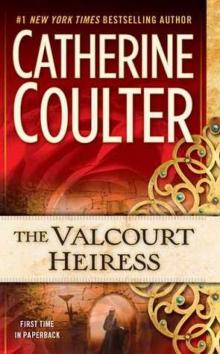 The Valcourt Heiress
The Valcourt Heiress Bombshell
Bombshell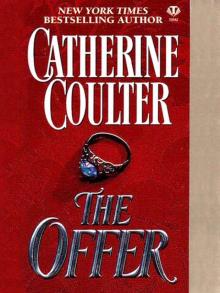 The Offer
The Offer The Edge
The Edge The Lost Key
The Lost Key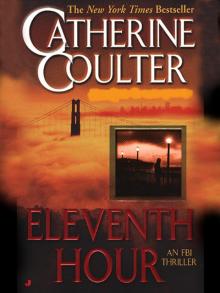 Eleventh Hour
Eleventh Hour Blindside
Blindside Devil's Daughter
Devil's Daughter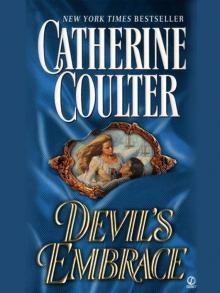 Devil's Embrace
Devil's Embrace Earth Song
Earth Song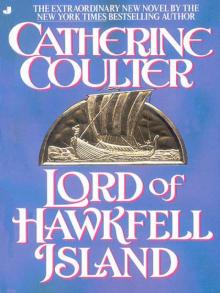 Lord of Hawkfell Island
Lord of Hawkfell Island Calypso Magic
Calypso Magic Lyon's Gate
Lyon's Gate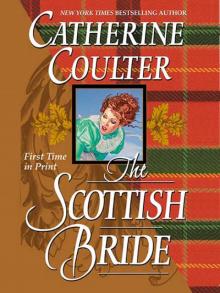 The Scottish Bride
The Scottish Bride Midsummer Magic
Midsummer Magic Split Second
Split Second Enigma
Enigma Blowout
Blowout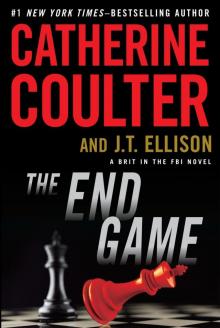 The End Game
The End Game Double Take
Double Take Moonspun Magic
Moonspun Magic The Courtship
The Courtship Prince of Ravenscar
Prince of Ravenscar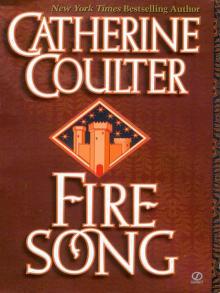 Fire Song
Fire Song Wizard's Daughter
Wizard's Daughter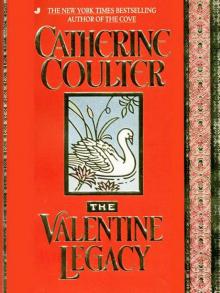 The Valentine Legacy
The Valentine Legacy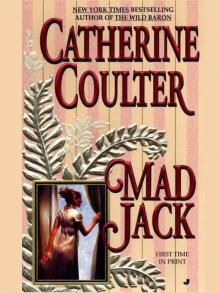 Mad Jack
Mad Jack The Last Second
The Last Second The Target
The Target Backfire
Backfire Season of the Sun
Season of the Sun Hemlock Bay
Hemlock Bay Insidious
Insidious Riptide
Riptide The Sixth Day
The Sixth Day Secret Song
Secret Song KnockOut
KnockOut Jade Star
Jade Star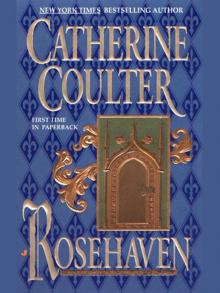 Rosehaven
Rosehaven The Hellion Bride
The Hellion Bride Pendragon
Pendragon Vortex
Vortex Lord of Falcon Ridge
Lord of Falcon Ridge The Nightingale Legacy
The Nightingale Legacy The Heiress Bride
The Heiress Bride The Deception
The Deception The Maze
The Maze Evening Star
Evening Star Wild Star
Wild Star The Final Cut
The Final Cut Paradox
Paradox The Devil's Triangle
The Devil's Triangle The Wild Baron
The Wild Baron Point Blank
Point Blank Labyrinth
Labyrinth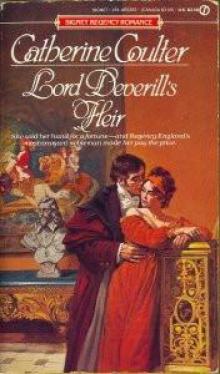 Lord Deverill's Heir
Lord Deverill's Heir The Sherbrooke Bride
The Sherbrooke Bride Deadlock
Deadlock Eleventh Hour f-7
Eleventh Hour f-7 Power Play (An FBI Thriller)
Power Play (An FBI Thriller) Aftershocks
Aftershocks Sherbrooke Twins tb-8
Sherbrooke Twins tb-8 Tail Spin ft-12
Tail Spin ft-12 The FBI Thrillers Collection
The FBI Thrillers Collection The Rebel Bride
The Rebel Bride Blindside f-8
Blindside f-8 Lyons Gate tb-9
Lyons Gate tb-9 Wyndham Legacy
Wyndham Legacy Point Blank f-10
Point Blank f-10 The Prince of Ravenscar
The Prince of Ravenscar Twice Dead
Twice Dead Night Shadow
Night Shadow Night Storm
Night Storm The Beginning
The Beginning The Maze ft-2
The Maze ft-2 Beyond Eden
Beyond Eden The FBI Thrillers Collection: Vol 11-15
The FBI Thrillers Collection: Vol 11-15 FALSE PRETENSES
FALSE PRETENSES The Edge f-4
The Edge f-4 Bombshell (AN FBI THRILLER)
Bombshell (AN FBI THRILLER) The Ancient Spirits of Sedgwick House (Grayson Sherbrooke's Otherworldly Adventures Book 3)
The Ancient Spirits of Sedgwick House (Grayson Sherbrooke's Otherworldly Adventures Book 3)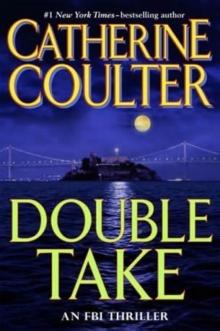 Double Take ft-11
Double Take ft-11 The Heir
The Heir Night Fire
Night Fire KnockOut ft-13
KnockOut ft-13 Hemlock Bay f-6
Hemlock Bay f-6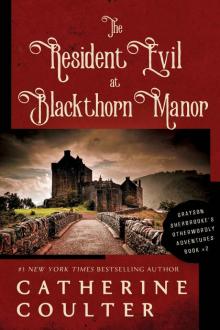 The Resident Evil at Blackthorn Manor (Kindle Single) (Grayson Sherbrooke's Otherworldly Adventures Book 2)
The Resident Evil at Blackthorn Manor (Kindle Single) (Grayson Sherbrooke's Otherworldly Adventures Book 2) Blowout ft-9
Blowout ft-9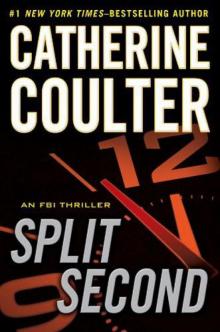 Split Second f-15
Split Second f-15 The Sherbrooke Series Novels 1-5
The Sherbrooke Series Novels 1-5 Impulse
Impulse Paradox (An FBI Thriller Book 22)
Paradox (An FBI Thriller Book 22) The Target f-3
The Target f-3 Backfire fst-16
Backfire fst-16 Born To Be Wild
Born To Be Wild Wizards Daughter tb-10
Wizards Daughter tb-10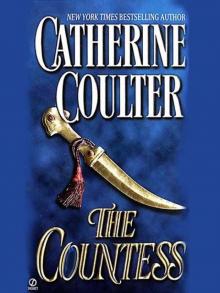 The Countess
The Countess